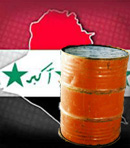
The Iraqi oil deal set to go before the country’s parliament next month could spell the end of the country as a nation state, and signals a major Bush victory in the war. The proposed law not only opens the door to the big international oil companies, but offers them lucrative contract deals, and even a place on the national oil board that will run the industry.
The Byzantine scheme for dividing up oil revenues on the basis of population is little more than a facade for the biggest rip off of resources since the British barged into Mesopotamia more than a century ago.
This law sanctions contracts between Iraq’s individual regions and foreign oil companies. It effectively puts an end to a nationalized petroleum industry that has provided most of the country’s revenue. Over time, the oil revenues might sustain an independent Kurdistan, along with a Shia state, and a Sunni state (though the Sunnis don’t have much oil, at least among the known Iraqi reserves). The law sets up a system that opens the door for foreign companies to make the country’s oil policy. A new federal Oil and Gas Council is to assist the Council of Ministers, “in coordination with the producing provinces and regions.” This council is to include the prime minister and other cabinet members, directors of the central bank, representatives from the various regions, and “executive managers from important related petroleum companies, including the national Iraqi oil company and the oil marketing company.”
Thanks to Raed Jarrar, you can read an English translation of the new law at Al-Ghad, the “voice of the democratic left in Iraq.”
The main opposition to the proposal comes from the federation of Iraq oil unions, whose president, Hasan Jum`ah `Awwad al-Asadi, Head of the Federation of Oil Unions, said in a February 6 speech that “We strongly warn all the foreign companies and foreign capital in the form of American companies against coming into our lands under the guise of production-sharing agreements.”
Al-Asadi called the law “unbalanced,” arguing that “it has been drafted in a great rush in harsh circumstances” and would set “region against region.” Other opponents of the deal have formed a coalition led by the London-based group Platform.
While the deal, on its face, splits up control of Iraq’s oil among Kurds, Shia and Sunnis, the real power remains in the hands of international companies that will craft contracts with Iraq’s regional entities and put up most or all of the money for exploration, development of infrastructure, and actual production, primarily through financial devices known as production sharing agreements. These agreements, which are not widely used in the industry, typically involve a public and a private partner, and stipulate that oil revenue will first go to the private partner to cover expenses and exploration costs. In Iraq, those costs are likely to be considerable since the industrial infrastructure will have to be rebuilt in many areas and much of the country’s oil has not yet been mapped. Arguments between the parties will be settled by tribunals outside Iraq.
The new law would give the international companies the right to set the rates of production of each oil field. These fields are immense; a single one can account for 10 percent of the nation’s budget.
“Sovereignty is surrendered with this law,” Ewa Jasiecz of Platform, the London-based group that has followed the evolution of the new law, tells Mother Jones from London. “Their dealings are secretive, in English. Disputes will be settled by international tribunals in Paris or Geneva. They operate outside Iraqi law.” (Platform has published an extensive critique of Iraqi oil politics here.)
Iraq currently has the second or third largest known oil reserves in the world; once completely mapped, it may turn out to have the largest reserves, period. These reserves will become more important over time because Saudi Arabia’s reserves are now widely believed to have been overstated, and are in any case beginning to decline. In that context, private control of oil in Iraq — not a member of OPEC — also presents a serious challenge to whatever control OPEC still has over prices and production. People who say the United States lost the war are missing an important point. The oil companies may well be winning.







